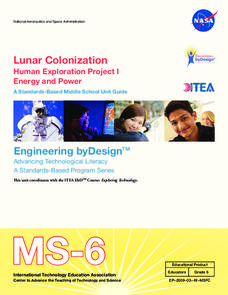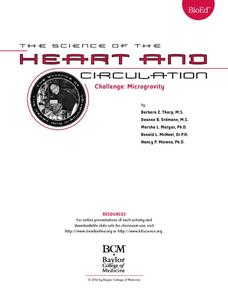Curated OER
What's Being Done?
Students explore the concept of animal welfare. In this philanthropy lesson, students examine legislation that supports animals in their state as well as the role of the American Society for the Prevention of Cruelty to Animals....
Library of Virginia
An Overview of American Slavery
The final lesson in a unit study of American slavery asks young historians to synthesize what they have learned about how slavery in America changed over time. Revisiting the many documents they have examined, they consider the economic,...
BioEd Online
The Skeleton
Don't be chicken to try a lesson plan that compares the anatomy of birds to humans. Read the background information so you don't have to wing it when it comes to the anatomy of a chicken. Prepare cooked chicken bones by soaking them in a...
Baylor College
Microbes and Disease
Discuss how diseases have impacted human history. Divide your class into groups and assign each group one of the following: tuberculosis, malaria, plague, cholera, smallpox, and AIDS. They read up on, complete a concept map, and present...
NASA
Lunar Colonization
A five-lesson unit challenges teams to design a complex to allow people to colonize the Moon. The teams first work in order to understand the challenge before becoming experts. Expert teams learn about different aspects needed to survive...
Wild Screen
Design a Conservation Programme
In a comprehensive project, teen ecologists read case studies to learn about successful conservation programs, then work together to research an ecosystem. The project culminates with either an in-class presentation about a conservation...
Baylor College
The Variety and Roles of Microbes
Mini microbiologists play a card game in which they group microorganisms by groups: virus, fungus, protist, or bacteria. Then they identify the roles different microbes play in the natural world and explore how humans effectively use...
Baylor College
Food for Kids
Immediately capture the attention of your class with the smell of freshly popped popcorn in the sixth lesson of this series on the needs of living things. Young scientists first use their senses to make and record observations of...
Curated OER
Basic Needs
Students examine the unique and diverse historical artifacts that people have designed to fulfill their everyday needs in extraordinary ways. They identify ways humans have used design throughout history to enhance the ways they meet...
Baylor College
A Place to Be
Home sweet home. Humans, birds, beavers, ants, we all need a place place to rest and keep us safe. In the ninth lesson of this series, the importance of shelter is discussed as the teacher reads aloud the book Tillena Lou's Day in the...
Curated OER
Viewpoint on Causes of Global Warming - An Assignment Using Anonymous Electronic Peer Review With a Dropbox
Students are told that studies exist that suggest human activities are not causing warming of the Earth. Students are given the opportunity to further their writing, critical thinking and reasoning skills. While enhancing their computer...
Curated OER
Do Not Bleach!
Students explore the importance of protecting the coral reefs. In this Oceanography lesson, student examine how coral reefs benefit humans, identify major threats to the reefs, and discuss actions to reduce these threats.
Curated OER
Truth, Trash and Treasure
Middle schoolers investigate how democracy in the United States makes civic virtue possible. They examine the rights and responsibilities associated with democracy. In small groups, they create public service posters that highlight these...
Baylor College
Needs of Living Things: Post-Assessment
Assess your class's knowledge of the needs of living things with the final lesson in a series. Given a large piece of paper and coloring utensils, young scientists draw a picture of themselves and a plant or animal of their choosing,...
K20 LEARN
Water We Going To Do? Floodplains And Watershed Management
How has human activity affected Earth's watersheds? An action-packed lesson plan, part of the K20 Center, examines water's ability to go with the flow regardless of what is in its path. Scholars build model watersheds, examine time-lapse...
Baylor College
Why Circulate?
Lub-dub, lub-dub. Why does the heart beat? Why does blood circulate throughout the body? Life scientists find out how important circulation is for dissolving and dispersing materials by timing how long it takes for food coloring spread...
Baylor College
Examining the Heart
Break hearts with this lesson plan: chicken or sheep hearts, that is! Your class examines the external and internal structure of the heart with a dissection activity. A handy anatomy resource provides the necessary materials for...
Baylor College
Challenge: Microgravity
What a festive way to examine what happens to the heart in different gravitational situations! Small groups place a water-filled balloon in different locations (on a table top, in a tub of water, and held in a vertical position), drawing...
Baylor College
What Is a Neuron?
Your class won't get on your nerves while doing this modeling activity! After teaching the structure and function of a neuron using the included diagrams, give individuals some clay and chenille stems so that they can make their own...
Baylor College
Neural Network Signals
Using a simple circuit with the battery representing the brain, future physiologists test to see which solutions conduct electrical "nerve impulses." Enlighten learners with plentiful information on electric signals in the nervous system...
Baylor College
Heart and Lungs
With a partner, youngsters measure their pulse and breathing rates, both at rest and after running in place for a minute. While this activity is not novel, the lesson plan includes a large-scale classroom graphing activity and other...
Curated OER
Flawed Democracies
Ninth graders examine the struggle for equal opportunity. In this American Government activity, 9th graders create a timeline outlining various groups' struggles for equal opportunity. Students research and construct a timeline to...
Curated OER
Understanding Advocacy
Young scholars explore the work of Jane Goodall. In this advocacy lesson, students investigate the life and work of Jane Goodall. Young scholars examine her work as an animal advocate and explore their own personal advocacy styles.
Curated OER
I Am Who We Are
Students explore the concept of philanthropy and identify specific acts of philanthropy that have affected them personally. They plan and carry out acts of philanthropy focusing on giving back to their community.

























